TOUG H
Page 106
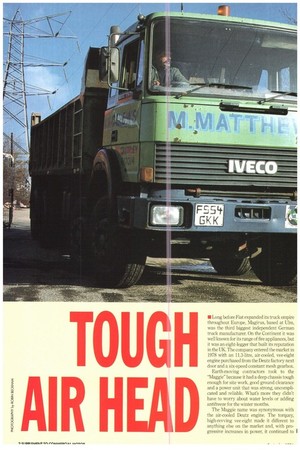
Page 107
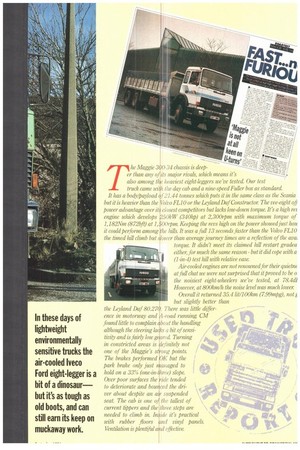
Page 108
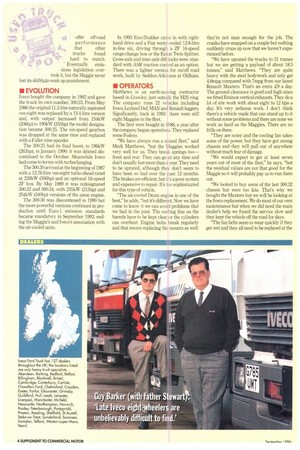
Page 109
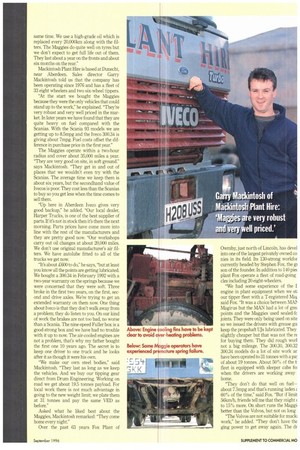
Page 110
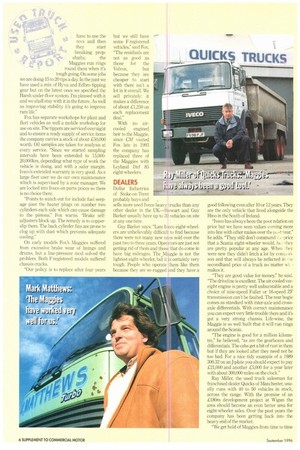
Page 111
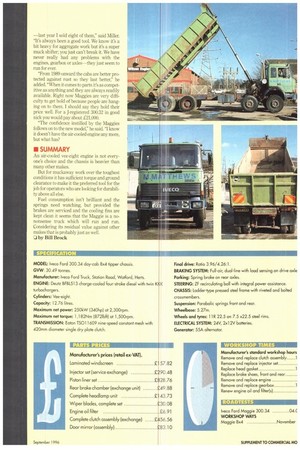
If you've noticed an error in this article please click here to report it so we can fix it.
HEAD
In these days of lightweight environmentally sensitive trucks the air-cooled lveco Ford eight-legger is a bit of a dinosaur— but it's as tough as old boots, and can still earn its keep on muckaway work.
• Long before Fiat expanded its truck empire throughout Europe, IVIagirus, based at Ulm, was the third biggest independent German truck manufacturer. On the Continent it was well known for its range of fire appliances, but it was an eight-legger that built its reputation in the UK. The company entered the market in 1978 with an 11.3-litre, air-cooled, vee-eight engine purchased from the Deutz factory next door and a six-speed constant mesh gearbox.
Earth-moving contractors took to the "Maggie" because it had a deep chassis tough enough for site work, good ground clearance and a power unit that was strong, uncomplicated and reliable, What's more they didn't have to worry about water levels or adding antifreeze for the winter months.
The Maggie name was synonymous with the air-cooled Deutz engine. The torquey, high-revving vee-eight made it different to anything else on the market and, with progressive increases in power, it continued to I
to offer off-road performance $4,44 that other ot_ trucks found
• .
0 hard to match. -0 Eventually emissions legislation overtook it, but the Maggie never lost its abilitylo soak up punishment.
• EVOLUTION
Iveco bought the company in 1982 and gave the truck its own number, 300.23. From May 1986 the original 11.3-litre naturally aspirated vee-eight was replaced by a 13.4-litre version and, with output increased from 154kW (206hp) to 190kW (255hp) the model designation became 30(125. The six-speed gearbox was dropped at the same time and replaced with a Fuller nine-speeder.
The 300.25 had its final boost, to 196kW (263hp), in January 1990: it was deleted discontinued in the October. Meanwhile Iveco had come to terms with turbocharging.
The 30030 arrived at the beginning of 1987 with a 12.76-litre vee-eight turbo-diesel rated at 228kW (306hp) and an optional 16-speed ZF box. By May 1989 it was redesignated 30(132 and 300.34, with 235kW (315hp) and 254kW (340hp) versions of the same engine.
The 300.30 was discontinued in 1990 but the more powerful versions continued in production until Euro-1 emission standards became mandatory in September 1992; ending the Maggie's and lveco's association with the air-cooled units. In 1993 EuroTrakker came in with righthand drive and a Fiat water-cooled 13.8-litre in-line six, driving through a ZF 16-speed range-change box or the Eaton Twin Splitter. Cross-axle and inter-axle diff-locks were standard with ASR traction control as an option. There was a lighter version for on/off road work, built by Seddon-Atkinson at Oldham.
• OPERATORS
Matthews is an earth-moving contractor based in Crawley, just outside the M25 ring. The company runs 22 vehicles including Iveco, Leyland Daf, MAN and Renault leggers. Significantly, back in 1993 there were still eight Maggies in the fleet, . The first were bought in 1988, a year after the company began operations. They replaced some Fcxiens.
"We have always run a mixed fleet," said Mark Matthews, "but the Maggies worked very well for us. They break springs too— front and rear. They can go at any time and don't usually last more than a year. They need to be uprated, although they don't seem to have been so bad over the past 12 months. The brakes are efficient, but it's a poor system and expensive to repair. It's too sophisticated for this type of vehicle.
"The air-cooled Deutz engine is one of the best," he adds, "but it's different. Now we have come to know it we can avoid problems that we had in the past. The cooling fins on the barrels have to be kept clear or the cylinders can overheat. Engine bolts break regularly and that means replacing the mounts as well: they're not man enough for the job. The cranks have snapped on a couple but nothing suddenly crops up now that we haven't experienced before.
"We have uprated the trucks to 31 tonnes but we are getting a payload of about 18.5 tonnes," said Matthews. "They are quite heavy with the steel bodywork and only get 4.8mpg compared with 7mpg from our latest Renault Maxters. That's an extra £9 a day. The ground clearance is good and high since we fitted Eminox vertical exhausts. They do a lot of site work with about eight to 12 tips a day. It's very arduous work I don't think there's a vehicle made that can stand up to it without some problems and there are none we work as hard as the Maggies. There are no frills on them.
"They are noisy and the cooling fan takes some of the power, but they have got strong chassis and they will pull out of anywhere without much fear of damage.
"We would expect to get at least seven years out of most of the fleet," he says, "but the residual values are not that good for the Maggie so it will probably pay us to run them out "We looked to buy some of the last 300.32 chassis but were too late. That's why we bought the Maxters but we will be looking at the Iveco replacement. We do most of our own maintenance but when we did need the main dealer's help we found the service slow and they kept the vehicle off the road for days.
"The fan belts seem to wear quickly if they get wet and they all need to be replaced at the same time. We use a high-grade oil which is replaced every 20,000km along with the filters. The Maggies do quite well on tyres but we don't expect to get full life out of them. They last about a year on the fronts and about six months on the rear."
Mackintosh Plant Hire is based at Dunecht, near Aberdeen. Sales director Garry Mackintosh told us that the company has been operating since 1976 and has a fleet of 33 eight wheelers and two six-wheel tippers.
"At the start we bought the Maggies because they were the only vehicles that could stand up to the work," he explained. "They're very robust and very well priced in the market. In later years we have found that they are quite heavy on fuel compared with the Scanias. With the Scania 93 models we are getting up to 8.5mpg and the Iveco 300.34 is giving about 7mpg. Fuel costs offset the difference in purchase price in the first year."
The Maggies operate within a two-hour radius and cover about 35,000 miles a year. "They are very good on site, in soft ground." says Mackintosh. "They get in and out of places that we wouldn't even try with the Scanias. The average time we keep them is about six years, but the secondhand value of Ivecos is poor. They cost less than the Scanias to buy so you get less when the time comes to sell them.
"Up here in Aberdeen Iveco gives very good backup," he added. "Our local dealer, Harper Trucks, is one of the best supplier of parts. If it's not in stock then it's there the next morning. Parts prices have come more into line with the rest of the manufacturers and they are pretty good now. "Our workshops carry out oil changes at about 20,000 miles. We don't use original manufacturer's air filters. We have autolube fitted to all of the trucks we get now
"It's about £600 to do," he says, "but at least you know all the points are getting lubricated. We bought a 300.34 in February 1992 with a two-year warranty on the springs bemuse we were concerned that they were soft. Three broke in the first two years, on the first, second and drive axles. We're trying to get an extended warranty on them now. One thing about Iveco is that they don't walk away from a problem; they do listen to you. On our kind of work the brakes are not too bad, no worse than a Scania. The nine-speed Fuller box is a good strong box and we have had no trouble with it up to now. The air-cooled engines are not a problem, that's why my father bought the first one 10 years ago. The secret is to keep one driver to one truck and he looks after it as though it were his own.
"We make our own steel bodies," said Mackintosh. "They last as long as we keep the vehicles. And we buy our tipping gear direct from Drum Engineering. Working on road we get about 19.5 tonnes payload. For local work there is not much advantage in going to the new weight limit; we plate them at 31 tonnes and pay the same VED as before."
Asked what he liked best about the Maggies, Mackintosh remarked: "They come home every night."
Over the past 63 years Fox Plant of
Owinby, just north of Lincoln, has devel into one of the largest privately owned co nies in its field. Its 130-strong workfot currently headed by Stephen Fox, the gi son of the founder. In addition to 140 piet plant Fox operate a fleet of road-going cies including 20 eight-wheelers.
"We had some experience of the engine in plant equipment when we st our tipper fleet with a T-registered Ma said Fox. "It was a choice between MAI', Magirus but the MAN had a lot of grec points and the Maggies used sealed-fc joints. They were only being used on site so we issued the drivers with grease go keep the propshaft Uis lubricated. They slightly cheaper but that was not the re for buying them. They did rough wonl not a big mileage. The 300.30. 300.32 300.34 models do a lot of site work at have been uprated to 31 tonnes with a pa; of about 19 tonnes. About 50% of the t fleet is equipped with sleeper cabs fol when the drivers are working away home.
"They don't do that well on fuel— about 7.5mpg and that's running laden 2 60% of the time," said Fox. "But if limit 56km/h, friends tell me that they might ( to 15% more. On short runs the Maggii better than the Volvos, but not on long "The Volvos are not suitable for muck; work," he added. "They don't have the ging power to get away again. The dr have to use the
• revs and then 41,4 they start breaking prop shafts: the Maggies run rings round them when it's tough going. On some jobs we are doing 15 to 20 tips a day. In the past we have used a mix of Hyva and Edbro tipping gear but on the latest ones we specified the Harsh underfloor system. I'm pleased with it and we shall stay with it in the future. As well as improving stability it's going to improve ram life."
Fox has separate workshops for plant and fleet vehicles as well a mobile workshop for use on site. The tippers are serviced overnight and to ensure a ready supply of service items the company carries a stock of about £50,000 worth. Oil samples are taken for analysis at every service. "Since we started sampling intervals have been extended to 15,00020,000km, depending what type of work the vehicle is doing, and with a safer margin. Iveco 's extended warranty is very good. As a large fleet user we do our own maintenance which is supervised by a zone manager. We are locked into Iveco on parts prices so there is no choice there.
"Points to watch out for include fuel seepage past the heater plugs on number two cylinders each side which can cause damage to the pistons." Fox warns. "Brake self. adjusters block up. The remedy is to copperslip them. The back cylinder fins are prone to clog up with dust which prevents adequate cooling."
On early models Fox's Maggies suffered from excessive brake wear of linings and drums, hut a line-pressure mod solved the problem. Both 17-registered models suffered chassis cracks.
"Our policy is to replace after four years
but we still have some 17-registered vehicles," said Fox. "The residuals are not as good as those for the Volvos, but because they are cheaper to start with there isn't a lot in it overall. We sell privately: it makes a difference of about £1,250 on each replacement deal."
With no aircooled engined heir to the Maggie, since CM visited Fox late in 1993 the company has replaced three of the Maggies with Leyland Daf 85 eight-wheelers.
DEALERS
Dollar Industries of Stoke-on-Trent probably buys and .
sells more used Iveco heavy trucks than any other dealer in the UK—Stewart and Guy Barker usually have up to 30 vehicles on site at any one time.
Guy Barker says: "Late Iveco eight-wheelers are unbelievably difficult to find because there were not many new ones sold over the past two to three years. Operators are just not getting rid of them and those that do come in have big mileages. The Maggie is not the lightest eight-wheeler, but it is certainly very tough. People who operate them like them because they are so rugged and they have a good following even after 10 or 12 years. They are the only vehicle that lived alongside the Hino in the South of Ireland.
"Iveco has always been the poor relation on price but we have seen values coning more into line with other makes over the 1,i st year," he adds. "They still don't command i n price that a Scania eight-wheeler would, hi. they are pretty popular at any age. When hey were new they didn't fetch a lot by comp rison and that will always be reflected in ie secondhand price of a truck no matter w makes it.
"They are good value for money," he said. "The driveline is excellent. The air-cooled vet'eight engine is pretty well unburstable and a choice of nine-speed Fuller or 16-speed ZF transmission can't be faulted The rear bogie comes as standard with inter-axle and crossaxle differentials. With correct maintenance you can expect very little trouble there and it got a very strong chassis. Life-wise, the Maggie is so well built that it will run rings around the Scania.
"The engine is good for a million kilometre," he believed, "as are the gearboxes and differentials. The cabs get a bit of rust in them but if they are looked after they need not be too bad. For a nice tidy example of a 1989 300.32 on an J-plate you should expect to pay £21,000 and another £5,000 for a year later with about 300,000 miles on the clock."
Ray Miller. the used truck salesman for franchised dealer Quicks of Manchester, usually runs with 40 to 50 vehicles in stock, across the range. With the promise of an L.180m development project at Wigan the area should become an even better area for eight-wheeler sales. Over the past years the company has been getting back into the heavy end of the market.
"We get hold of Maggies from time to time —last year I sold eight of them," said Miller. "It's always been a good tool. We know it's a bit heavy for aggregate work but it's a super muck shifter; you just can't break it. We have never really had any problems with the engines, gearbox or axles—they just seem to run for ever.
"From 1989 onward the cabs are better protected against rust so they last better," he added. "When it comes to parts it's as competitive as anything and they are always readily available. Right now Maggies are very difficulty to get hold of because people are hanging on to them. I should say they hold their price well. For a J-registered 300.32 in good nick you would pay about £21,000.
"The confidence instilled by the Maggies follows on to the new model," he said. "I know it doesn't have the air-cooled engine any more, but what has?
• SUMMARY
An air-cooled vee-eight engine is not everyone's choice and the chassis is heavier than many other makes.
But for muckaway work over the toughest conditions it has sufficient torque and ground clearance to make it the preferred tool for the job for operators who are looking for durability above all else.
Fuel consumption isn't brilliant and the springs need watching, but provided the brakes are serviced and the cooling fins are kept clean it seems that the Maggie is a nononsense truck which will run and run. Considering its residual value against other makes that is probably just as well.
J by Bill Brock SPECIFICATION 111111=1■111■1111•10
MODEL: Iveco Ford 300.34 day-cab 8x4 tipper chassis.
GVW: 30.49 tonnes.
Manufacturer: Iveco Ford Truck, Station Road, Watford, Herts.
ENGINE: Deutz BFBL513 charge-cooled four-stroke diesel with twin KKK
turbochargers.
Cylinders: Vee-eight.
Capacity: 12.76 litres.
Maximum net power: 250kW (34011p) at 2.,300rpm.
Maximum net torque: I ,182Nm 1872161t) at 1,500rpm.
TRANSMISSION: Eaton T5011609 nine-speed constant mesh with 420mm diameter single dry plate clutch. Final drive: Ratio 3.96/4.26:1.
BRAKING SYSTEM: Full-air, dual-line with load sensing on drive axle
Parking: Spring brake on rear axles.
STEERING: ZF recirculating ball with integral power assistance
CHASSIS: Ladder-type pressed steel frame with riveted and bolted
crossmembers Suspension: Parabolic springs front and rear.
Wheelbase: 5.27m Wheels and tyres: 11R 22.5 on 7.5 x22.5 steel rims.
ELECTRICAL SYSTEM: 24V, 2x12V batteries Generator: 55A alternator.
WORKSHOP TIMES
Manufacturer's standard workshop hours Remove and replace clutch assembly 1 Remove and replace injector set Replace head gasket 1 Replace brake shoes, front and rear Remove and replace engine Remove and replace gearbox 1 Renew engine oil and filteris)
ROAD
Iveco Ford Maggie 300.34 04.0 WORKSHOP WAYS Maggie 8x4 November








































































































































